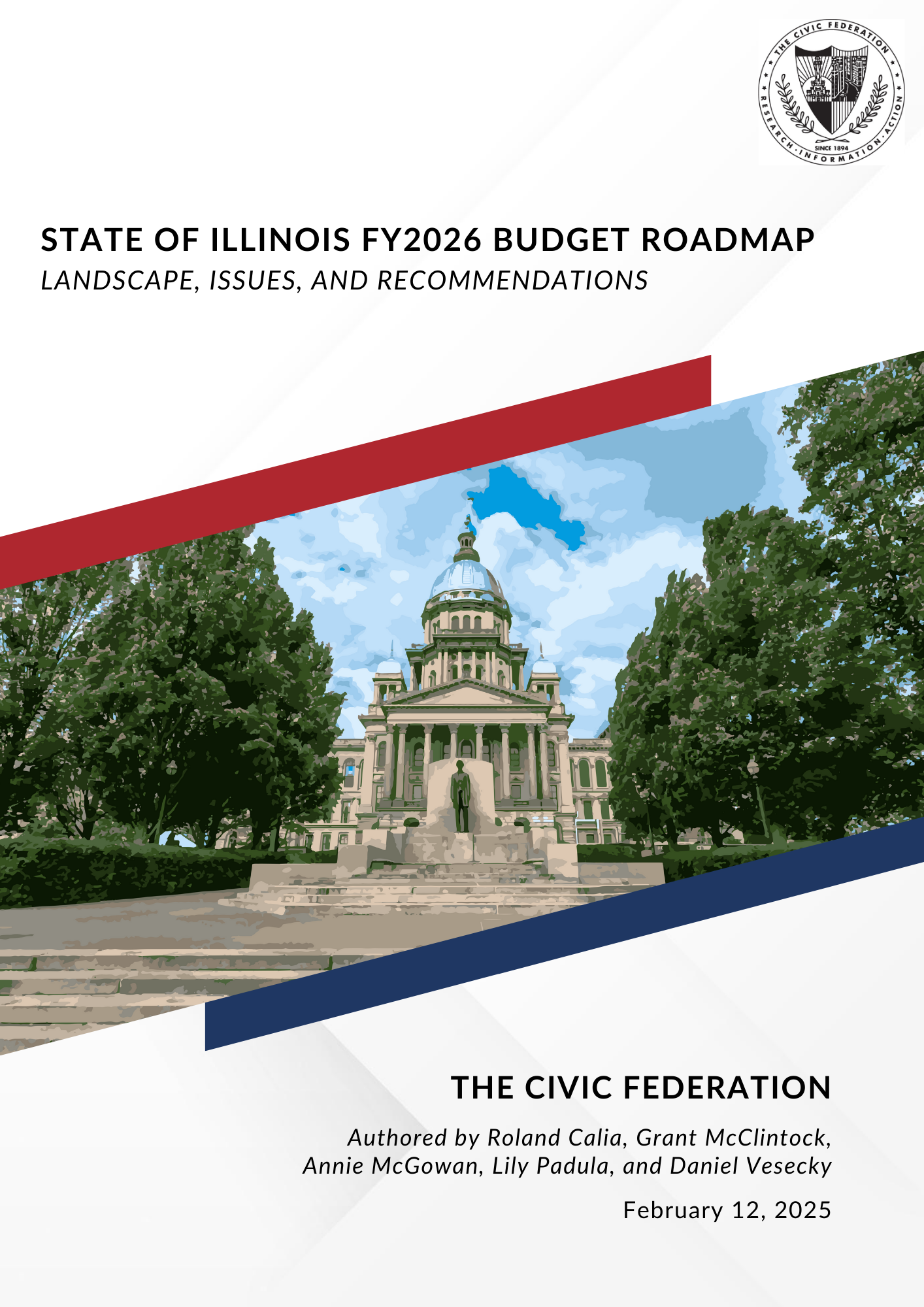February 12, 2025
Click here to read the full report.
Click here to read the one-pager.
Click here to view the infographic.
Executive Summary
The State of Illinois (Illinois or the “State”) has made significant progress in stabilizing its budget in recent years, yet still faces ongoing financial challenges, including a high tax burden, structural budget deficits, and legacy pension obligations, all of which put a strain on the state’s long-term sustainability. Overshadowing these challenges is the unprecedented uncertainty in Washington, D.C., with a new federal administration that threatens to eliminate billions of dollars in federal funding and disrupt the fragile government ecosystem. While the impacts of threatened or looming cuts to core government services and programs, including Medicaid, education funding, environmental protection programs, and medical research, are still unknown, the uncertainty surrounding federal funding of state and local government is a serious concern that must be part of conversations about strengthening Illinois’ fiscal stability and resilience.
With full acknowledgment of the possible impacts of those external forces, the Civic Federation urges stakeholders and elected officials in both the executive and legislative branches to recognize and embrace Illinois’ need for a long-term strategic framework to ensure consistent revenue growth, efficient spending, and economic competitiveness. Decisions being made at the federal level make it even more important for the State of Illinois to review and re-set its taxation, budget, and decision-making structures to ensure stable and resilient fiscal footing.
In this report, the Civic Federation presents a comprehensive set of solutions for lawmakers to consider over the next several years—not as immediate fixes for the upcoming fiscal year 2026 (FY2026) budget deficit but as a roadmap for long-term sustainability. Instead of approaching each budget year with a short-term lens, the Civic Federation calls on the Governor and Illinois General Assembly members to conduct a holistic re-evaluation of the State’s fiscal structure and implement a more strategic approach to budgeting. Our recommendations focus on tax modernization, performance-based budgeting improvements, and greater fiscal transparency, with the goals of promoting economic growth and sustainable public investments.
At its core, the State’s outdated tax structure fails to align with the modern economy, placing an excessive burden on certain taxpayers while discouraging business investment. The stagnant revenue base has not kept pace with rising spending demands, exacerbating budgetary pressures. Unclear performance-based budgeting metrics and poor systemic decision-making further complicate spending prioritization. Persistent pension liabilities continue to strain finances, requiring urgent reforms to ensure fiscal stability. Meanwhile, insufficient reserves leave the state vulnerable to economic downturns, and a lack of transparency in policymaking undermines public trust and accountability in the budgeting process. Addressing these issues through strategic tax modernization, improved budgetary planning, and greater fiscal transparency is essential for Illinois’ long-term financial health.
To address these challenges and establish a path toward fiscal sustainability, the Civic Federation urges Illinois lawmakers to consider the following key reforms:
Modernize Illinois' Tax Structure: Illinois’ tax structure must align with the modern economy. As part of a broader examination of the tax structure to generate sustainable revenue growth, Illinois should consider expanding the sales tax base to include services, conduct a systematic review of tax exemptions, evaluate and develop a sustainable revenue structure, and review and consolidate Special Funds.
Strengthen the Budgeting Process through Strategic Financial Planning: The State should improve the transparency of the strategic budget planning process and conduct long-term planning and evaluation. As part of this, the State should:
- Enhance the performance-based budgeting process to ensure spending decisions are data-driven and aligned with measurable outcomes;
- Address pension liabilities and avoid unnecessary Tier 2 benefit enhancements by only enacting changes targeted at compliance with Social Security Safe Harbor guidelines;
- Increase the level of reserves to constitute a more robust rainy day fund;
- Support local governments by collaborating with local government entities on funding matters; and
- Improve transparency in state decision-making to ensure a more cooperative and open policy-making process.
Illinois must move beyond short-term budget fixes and adopt a strategic, long-term approach to fiscal management. By modernizing its tax system, improving budget decision-making, ensuring pension sustainability, and increasing transparency, the State can promote economic growth, attract investment, and ensure financial stability for future generations.
This report is intended to spur legislative discussions and policy actions that will strengthen Illinois’ fiscal health for this year and the years ahead.
Click here to read the full report.
Click here to read the one-pager.
Click here to view the infographic.

